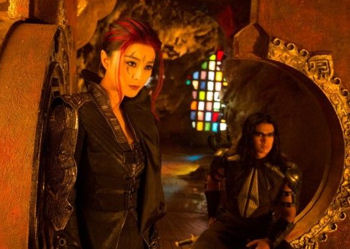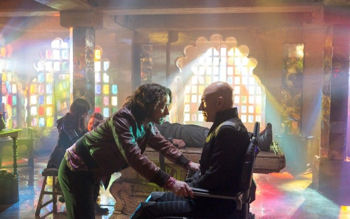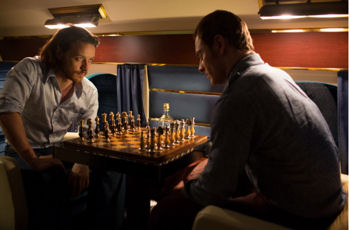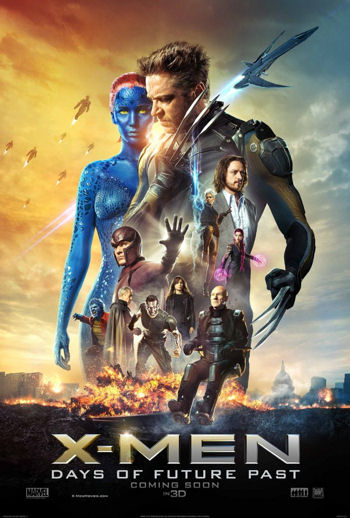|
X-Men:
Days of
Future Past
Once before, the X-Men faced down the Sentinels at the beginning of a movie. Previously, the mutants won but we lost, because that scene was a Danger Room sequence in The Last Stand. There, the Sentinels were never really a possibility, which was probably the first clue that director Brett Ratner was setting out to give us cool imagery that added up to nothing.
And yes, he almost killed the franchise, though it had one more gasp with X-Men Origins: Wolverine, which made enough money to put it on life support, but still... those were dark times.
Fox went back in time and revitalized X-Men with Matthew Vaughn and Jane Goldman's take on First Class -- set in the sixties, and we wouldn't have to worry about what had come before. But still, we had to reconcile the two teams, and the younger actors, James McAvoy and Michael Fassbender, powerful enough to believably grow into Patrick Stewart and Ian McKellen.
The answer? Go back to the beginning with director Bryan Singer, perhaps troubled in real life but still the kind of storyteller who can make things add up even if not everything is in the equation. He can take the dark times, show us the possibilities, and still let things end in hope.
Working from a script by Goldman and Simon Kinberg, Singer very loosely adapts the concepts of the original comics story "Days of Future Past," at least weaving the same themes through the movie line-ups of the teams.
 He adds a few, even though you'd think it was stuffed with actors we knew. And the surprise is that after it's all over, you kind of wish there had been more of Evan Peters as Quicksilver, here "Peter" Maximoff and owning a Walkman about a decade before it was invented. But that's what I mean about not everything being in the equation: plot flaws abound, but the characterization is done so well that it counters the problems. He adds a few, even though you'd think it was stuffed with actors we knew. And the surprise is that after it's all over, you kind of wish there had been more of Evan Peters as Quicksilver, here "Peter" Maximoff and owning a Walkman about a decade before it was invented. But that's what I mean about not everything being in the equation: plot flaws abound, but the characterization is done so well that it counters the problems.
The film begins with a flashy post-apocalyptic prologue, a combination of images from The Terminator and Soylent Green, in a world where the Sentinels, giant evolved biomechanical androids, rule over mankind.
Eventually we get to the last remaining X-Men, including new to the screen Bishop (Omar Sy), Blink (Bingbing Fan), Sunspot (Adan Canto) and Warpath (Booboo Stewart). They form a front line to protect the ones we know, including Shadowcat (Ellen Page), Iceman (Shawn Ashmore) and Colossus (Daniel Cudmore).
Chased around the world by the Sentinels, these last mutants join up with Professor X, Magneto and, of course, Wolverine (Hugh Jackman), who doesn't age but inexplicably has grey hair. But you know what? He did in the original comics version of the story, too. Did I mention Sentinels?
 All this horror actually started in 1973, when Mystique (Jennifer Lawrence) killed the inventor of the Sentinels, Bolivar Trask (Peter Dinklage). The assassination triggered outrage and an acceleration of Trask's Sentinels project, and the robots evolved out of mankind's control. All this horror actually started in 1973, when Mystique (Jennifer Lawrence) killed the inventor of the Sentinels, Bolivar Trask (Peter Dinklage). The assassination triggered outrage and an acceleration of Trask's Sentinels project, and the robots evolved out of mankind's control.
Luckily, Shadowcat doesn't just phase through walls; she can phase minds through time. And Wolverine volunteers to send his mind back in time to find the younger X and Magneto in order to stop Mystique.
To outsiders, that probably sounds convoluted, and it is. Singer doesn't stop there, throwing twists and curves the way Magneto twists rebar to combat Wolverine. Somehow, though, it all flows.
At heart, it's because Singer did grasp why the X-Men is so popular in comics; it's not really so much about the fighting as it is the soap opera. Take away the powers and it's about a friendship ruined when two men refuse to see the woman they both love for who she really is. Even when some of the turns of events threaten to feel silly, McAvoy and Fassbender never really let you forget that core.
 Of course there are plenty of super-powered shenanigans. The aforementioned appearance of Quicksilver raises the bar for using super-speed in The Flash and Avengers: Age of Ultron. Of course there are plenty of super-powered shenanigans. The aforementioned appearance of Quicksilver raises the bar for using super-speed in The Flash and Avengers: Age of Ultron.
Peters plays a version younger than we even ever saw in the comics, but it does seem like the right take -- the arrogance of late adolescence coupled with the ability to pretty much get away with anything he wants. A fragile moral code still holds him back a bit, and it's possible -- though maybe not probable -- that the next film will explore that more.
It's also nice to see -- and hear -- a superhero movie rely on orchestral music. The Amazing Spider-Man 2 was stuffed full of a rock soundtrack, but Singer gives long-time musical collaborator John Ottman room to for an old-fashioned score, and it really stands out.
In the end, X-Men: Days of Future Past does everything it's meant to do. Though it's not quite the clean reboot J. J. Abrams' Star Trek was, it does leave fans with a greater ability to pick and choose what they want to still use. You can wipe the taste of 'The Last Stand out of your mouths, and probably safely restart Deadpool without anything being a contradiction. Let's face it, the past is the past. Thanks to the return of Bryan Singer, the X-Men once again have a cinematic future.
Other
X-Men articles:
Interview
with Tom DeSanto (the first film)
Interview
with Bryan Singer (X2)
|

 He adds a few, even though you'd think it was stuffed with actors we knew. And the surprise is that after it's all over, you kind of wish there had been more of Evan Peters as Quicksilver, here "Peter" Maximoff and owning a Walkman about a decade before it was invented. But that's what I mean about not everything being in the equation: plot flaws abound, but the characterization is done so well that it counters the problems.
He adds a few, even though you'd think it was stuffed with actors we knew. And the surprise is that after it's all over, you kind of wish there had been more of Evan Peters as Quicksilver, here "Peter" Maximoff and owning a Walkman about a decade before it was invented. But that's what I mean about not everything being in the equation: plot flaws abound, but the characterization is done so well that it counters the problems.
 All this horror actually started in 1973, when Mystique (Jennifer Lawrence) killed the inventor of the Sentinels, Bolivar Trask (Peter Dinklage). The assassination triggered outrage and an acceleration of Trask's Sentinels project, and the robots evolved out of mankind's control.
All this horror actually started in 1973, when Mystique (Jennifer Lawrence) killed the inventor of the Sentinels, Bolivar Trask (Peter Dinklage). The assassination triggered outrage and an acceleration of Trask's Sentinels project, and the robots evolved out of mankind's control.
 Of course there are plenty of super-powered shenanigans. The aforementioned appearance of Quicksilver raises the bar for using super-speed in The Flash and Avengers: Age of Ultron.
Of course there are plenty of super-powered shenanigans. The aforementioned appearance of Quicksilver raises the bar for using super-speed in The Flash and Avengers: Age of Ultron.





